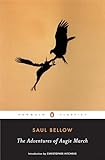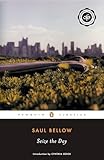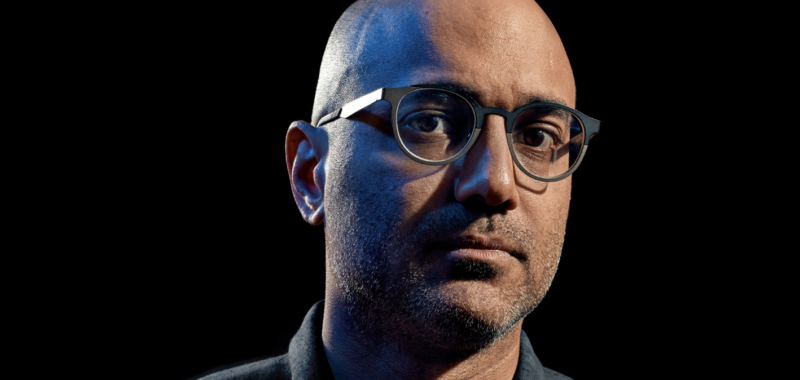McNeal, the new play by Ayad Akhtar, who won the Pulitzer Prize for Disgraced, focuses on an egocentric, self-destructive white male novelist, played by Robert Downey, Jr. The fictional Jacob McNeal—think Mailer or Roth at their worst—wins the Nobel Prize early in the play, but he’s guarding a secret: his latest novel was composed with an uncredited coauthor, an AI chatbot. The production, which considers the controversial notion that artificial intelligence might be a useful creative tool, closes on November 24 after a nearly sold-out run at Lincoln Center. Despite a largely negative critical reception, the show has touched a nerve, which in my view is one of the jobs of a serious writer.
I talked with Akhtar about his new play, the future of AI, and why he dislikes the advice to “show, don’t tell.”
Ronald K. Fried: When did you first think you could write something dramatic about A.I.?
Ayad Akhtar: February of ‘23. GPT had been live for about three months. And it was already clear to me that the future was going to be seriously impacted. And by April of ‘23, I saw a few things in Hollywood that shocked and astonished me. It was clear to me that the technology was far more powerful than we realized from a story point of view, and it was just a matter of time before this technology was going to start affecting the production of writing, creative writing. Which of course it now is. There was an article in the Hollywood Reporter that came out in June about how everybody is using AI but they’re not talking about it.
RKF: When I heard about AI, my first impulse was to dismiss it.
AA: Yeah that’s what’s going on now. People in the creative industries understandably, but many of us have our heads buried in the sand about what’s coming.
RKF: Do you think that taking a nuanced view of A.I.—and ending the play with a Shakespearian-style speech written with assistance from AI—touched a nerve?
AA: I think that oddly maybe you’re right, and maybe I didn’t quite fully get that. I have a friend at the Atlantic who saw the play early, early on who said, “My God what are you doing? You’re basically saying that it’s okay to use AI to write.” And I said, “I’m trying to figure out what it means that it’s in our lives. And what it means as a writer that this technology is increasingly front and center in our society.” I think that it’s naïve to think that it’s not. It’s real, it’s happening.
RKF: Did you see McNeal as a cautionary tale?
AA: Yes. I have a friend who saw it and said a wonderful thing about the play. He said, “It’s about yesterday, today, and tomorrow.” And I think that’s exactly right. It’s about literary values and a literary culture of yesterday which is giving way to a world of today, both of which are becoming increasingly within the shadows of tomorrow. And by yesterday, I mean values of language, values of form, values of a certain kind of aesthetic meaning, and a certain kind of aesthetic pleasure… and values of today which are about issues of identity and who holds power. And those aesthetic issues are much less front and center. And what’s coming tomorrow, which we don’t even know, because it’s automated.
 RKF: McNeal talks about the formulaic nature of what we see, and there’s a character in the play who hasn’t read The Adventures of Augie March and only vaguely knows who Saul Bellow is. Do we lose something by losing an appreciation of certain canonical writers?
RKF: McNeal talks about the formulaic nature of what we see, and there’s a character in the play who hasn’t read The Adventures of Augie March and only vaguely knows who Saul Bellow is. Do we lose something by losing an appreciation of certain canonical writers?
AA: I think it’s a question of values: we hold to certain aesthetic values and values of language. I think we’re increasingly driven by predictive technology which is seeking to turn us into predicted economic agents. And it has us captive to our screens north of six hours a day. And that’s the future of our cognition. We’re in a period of cognitive decay. And that means that some of the old things that we used to do are going to become less and less relevant, and some of the pleasures like the exquisite playfulness and brio, and startlingly surprising and endless pleasurable textures and rhythms of Saul Bellow are not going to be something that we engage in.
RKF: One of the things that upset me about the play—and I don’t mean this as a criticism—is the graphics which we see on screens on the stage: the visual image of AI gobbling up these canonical works that I’ve spent my adult life trying to understand. I actually found that scary.
AA: Yeah. And to riff for a minute because this is one of the things that some of the professional commentators were hopelessly obtuse about the play on some level—just failed to understand—is that some of those texts get uploaded early on, and we start seeing variations of the texts in the play. So Hedda Gabler, of course, is about a brilliant, maybe mentally unstable woman who burns a manuscript and then shoots herself, which is exactly what happens in the backstory of the play. So AI is gobbling up these texts and is then churning out variations of all the things that have been gobbled up to create the play that we’re now watching—as we do as artists.
RKF: How so?
 AA: Take that extraordinary ending for Seize the Day [by Saul Bellow]. Those few sentences of that finale have so marked almost everything I write. If you know that those few sentences are part of the lexicon of what moved me—you’ll find versions of those sentences in everything I write because I’m always trying to get back to that feeling I had when I read the end of Seize the Day. And it reminds me of the thing that Harold Bloom used to talk about, which is of course the anxiety of influence, but the specific mechanism by which the anxiety of influence works which is misprision. That is, I read a writer, and I think to myself, “Oh, they almost got it right. They didn’t quite get this thing right.” And it’s this misreading where I think that something is missing is actually my contribution that I go off then and I try to write the thing that I thought was great, but I try to add something to it. And that’s the process.
AA: Take that extraordinary ending for Seize the Day [by Saul Bellow]. Those few sentences of that finale have so marked almost everything I write. If you know that those few sentences are part of the lexicon of what moved me—you’ll find versions of those sentences in everything I write because I’m always trying to get back to that feeling I had when I read the end of Seize the Day. And it reminds me of the thing that Harold Bloom used to talk about, which is of course the anxiety of influence, but the specific mechanism by which the anxiety of influence works which is misprision. That is, I read a writer, and I think to myself, “Oh, they almost got it right. They didn’t quite get this thing right.” And it’s this misreading where I think that something is missing is actually my contribution that I go off then and I try to write the thing that I thought was great, but I try to add something to it. And that’s the process.
RKF: One of the things I love about Homeland Elegies is that it’s discursive and at-times essayistic. So I wonder, how do you feel about the advice to writers that one so often hears, “Show don’t tell.” I take it that you don’t agree with that.
AA: How could I? I think the regime of “show don’t tell” has impoverished literature. And I get it. It comes from a certain generation. Hemingway was the great proponent and the one who did it the best. And that led to a tenor in American writing that led to a certain kind of writing and a dogma and orthodoxy in the writing programs. But I think that that impoverishes literature’s possibilities. I’m a dramatist, and I come back to Shakespeare and Ibsen. There’s a lot of telling. You’ve got to show human behavior, you have to show action. Action has to be dramatized, not asserted. There’s a statistic that came out that 60 percent of human dialogue is narration. Sixty percent of what we say to each other is us narrating stories about other things to one another. If that’s not telling, I don’t know what is. So a mimesis of human telling, a mimesis of human language, a mimesis of human action invariably entails telling.
RKF: I want to ask you about something you said in the Guardian back in 2013: “I started to understand that for me art was no longer about self-expression but about creative engagement with the world. I started to respond in an excited way to making work inside an industry and not feeling the constraints of audience expectation as some kind of thing that I should avoid. There was a sea change in my attitude, and that’s when I finally became a writer.” Can you talk about that sea change—that moment?
AA: I was 15 when I was a student in high school when I had a teacher who made me want to become a writer. And easily for the next 15 years I had an idea about being a writer. That idea had something with to do with wanting to express myself, wanting to express myself in a way that distinguished me from others, that separated me somehow, that brought me some kind of esteem that I don’t want to cast aspersions on that I needed, that I wanted, I longed for that. But I started to realize that that was a futile and self-involved preoccupation. And I started to realize it wasn’t helping me write very well. I wasn’t writing things that anybody really wanted to pay any attention to. So I had a kind of coming of age that took quite a while, but right around the time that I was 30, 31, that’s when I started having this feeling that the world is wide, it’s filled with so much that I don’t know, and I’m so much more interested in it than I am in myself. And that was a natural turning away from the adolescent, post-adolescent, early adulthood pains and heartbreaks, and still maturing process, and coming to some stability and feeling like, Okay, I’m ready to realize that I don’t know anything, so can my writing—can my practice of writing—be about learning? Can it be about knowing? Can it be about growing in that way? And that’s when I say I became a writer.

